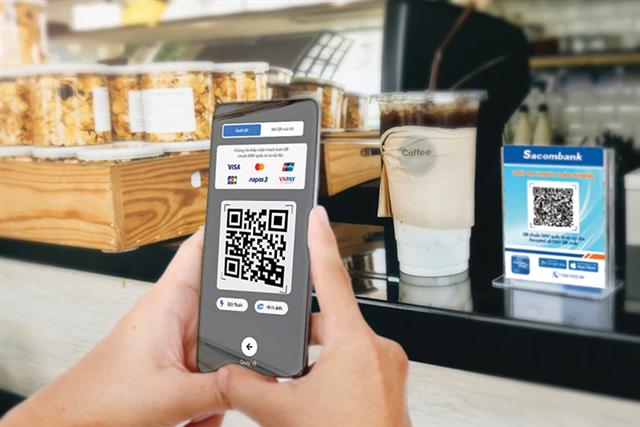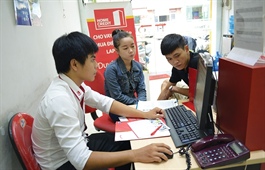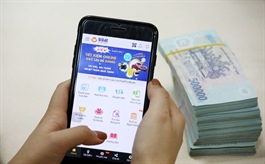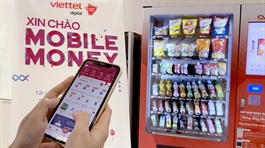Mobile money services step into limelight for unbanked
Mobile money services step into limelight for unbanked
Vietnamese telecom behemoths are gearing up to offer seamless mobile money services to tap into the lucrative contactless payment industry in Vietnam, with major focus on non-banked and underbanked mobile subscribers in remote areas.

The long-awaited implementation of mobile money is believed to enable banking-like solutions for those previously unbanked. Photo: Le Toan
|
Prime Minister Nguyen Xuan Phuc last week greenlit the two-year pilot application of mobile money, which allows the use of mobile phone accounts to pay for small-value goods and services. Following Decision No.316/QD-TTg, telecom service providers will have to build and send dossiers to the State Bank of Vietnam (SBV) for consideration and appraisal.
According to Nguyen Son Hai, deputy general director of state-owned telecom group VNPT, it is preparing technology, technical infrastructure, and its workforce to run mobile money services once it is approved to join the pilot programme.
“Besides experience in intermediary payment service provision, VNPT is equipped with the technology, connection infrastructure, security, and authentication technology equivalent to the banking system. We have teamed up with partners to offer internal training for staff. Thus, we can quickly deploy the new mobile money programme,” he added.
Compared with other competitors, VNPT has a competitive edge in the pilot programme due to its complete digital financial ecosystem. The VNPTPay e-wallet boasts nearly 50,000 points of sale across the country. In 2020, the e-wallet was integrated into the National Public Service Portal. It is one of the top online payment service providers through the portal.
The group has also completed the full technology suit necessary to build up an inclusive service ecosystem, including an education network (VnEdu), hospital management software service (VNPT HIS), one-stop gate software VNPT-iGate, and more.
Meanwhile, MobiFone officially received License No.09/GP-NHNN from the SBV for providing the intermediary payment service last week. This is deemed a necessary and sufficient condition for MobiFone to join the race for mobile money trial implementation.
Bui Son Nam, deputy general director of MobiFone, said that mobile money is the last piece of MobiFone’s digital ecosystem. Payment intermediaries and mobile money are important components in the overall strategy of MobiFone to accelerate digital transformation and expand business outside of telecommunications, as well as develop an e-commerce, payment, and finance ecosystem.
Nam further noted that MobiFone has ramped up its preparation for mobile money service provision early. MobiFone features a wide coverage of transaction points nationwide so the group can develop and diversify its structure of products, services, and customer base in the new field. MobiFone is ready to connect with transaction points accepting mobile money services.
New tipping point
Likewise, military-run Viettel Group has fully prepared to roll out the mobile money service after being greenlit. The group has built payment acceptance infrastructure and a service delivery system from urban to rural and remote areas. A practical digital ecosystem has also been formed, including digital payment and digital financial services, and e-commerce based on digital payments.
In particular, ViettelPay has over 100 features, serving as a solid foundation for Viettel to launch mobile money. ViettelPay now serves over 10 million customers, backed up by technology certificates and meeting international security standards.
Viettel expects that by 2025 it will boast 26 million subscribers using the mobile money service. Meanwhile, its revenue from the service is estimated to reach VND7-8 trillion ($305-350 million) per month by 2025.
Pham Trung Kien, CEO of Viettel Digital, expressed his optimism that mobile money adoption will be the tipping point for non-cash usage in Vietnam. “That means that overnight, any mobile phone users living in Vietnam has at their disposal the utilisation of contactless payment through mobile money services,” Kien said.
According to the SBV, Vietnam now has 89 million personal payment accounts, which means nearly 70 per cent of adults have bank accounts. However, the remaining 30 per cent have difficulties in accessing banking services.
Vietnamese regulators are trying to create an open and level playing field for mobile money and cashless payment services, which will allow both banks and non-bank providers to offer these services. The long-awaited implementation of mobile money is estimated to make non-cash payments accessible for more than 50 per cent of the underbanked and non-banked population in Vietnam.
Slow development
However, Marcin Miller, associate partner of consultancy McKinsey Vietnam, stated that mobile money is unlikely to generate a huge buzz in the e-payment landscape.
First and foremost, the success of mobile money has only occurred in certain geographical areas, mainly in Africa – for example in Kenya, where smartphone penetration is very low and people are still struggling in penetrating into a proper banking infrastructure.
“In Vietnam, the rate of smartphone usage in cities is 85 per cent, in rural areas 65 per cent. So when most people have access to e-wallets on mobile devices, why should they use mobile money?” he asked.
Secondly, Miller noted, the poor and underdeveloped banking infrastructure in Africa is the key silver lining in the function’s success on this continent.
However, even in rural areas of Vietnam, the coverage of bank branches is fairly good, which is in stark contrast to the situation in some African countries such as Kenya. Many more people can reach a bank branch easily, unlike people in rural Africa, with its own set of challenges.
Although Miller of McKinsey believed that mobile money will not make rapid changes or explosive growth in the e-payment landscape in Vietnam, this service will still lay the concrete foundation to bolster digital financial services in many areas of the market.
The BIDV Securities Company team emphasised that mobile money does not mean that banks or any payment intermediaries will lose their market share.
According to the latest regulations, businesses providing mobile money services are prohibited from performing traditional banking activities, such as lending and raising capital. At the same time, businesses are only allowed to provide mobile money services to transfer money and pay for legal goods and services in Vietnam, only for domestic transactions and not for any cross-border transactions.
“Mobile money is not a competitor to banks,” said Nguyen Dinh Thang, former chairman of the Board at LienVietPostBank.
In his perspective, banks may witness a downward trend of profit generated from payment of electricity and water bills.
“But instead, banks should focus on their major advantages which e-wallets or any payment intermediaries are not licensed, such as savings mobilisation, lending, and providing financial advices. The more people use mobile money, the greater cashless payment perception is enhanced,” Thang said.
On the other hand, Vietnam has been top among the most beneficiaries of remittances for the past few years. Recipients previously preferred receiving foreign currency in cash, but due to the COVID-19 crisis, they are encouraged to receive Vietnamese currency via bank accounts.
With the adoption of mobile money, market watchdogs expect that it will further facilitate international remittances in a safe and responsible manner, while reducing the risks of money laundering and terrorism financing.
Elsewhere, in Africa and other developing countries, traditional money transfer operators are also working with mobile money providers. Western Union has joined forces with Safaricom M-PESA in Kenya and PayMaya in the Philippines to provide cash transfer services through mobile. Bangladesh-based bKash mobile money is also collaborating with Mastercard to deliver remittance services.
Currently, Viettel Global – Viettel’s foreign subsidiary- operates in Cambodia, Laos, Timor Leste, Mozambique, Burundi, Haiti, Peru, Cameroon, Tanzania and Myanmar. It is predicted that Viettel’s new implementation of mobile money in Vietnam could further pave the way for its digital payment platform in Africa through mobile subscribers – a bid to compete with other international telecom giants.
While Vietnamese regulators have yet announced any international firms joining its mobile money programme, it could still eventually become a lucrative landscape for foreigners to latch onto.
























